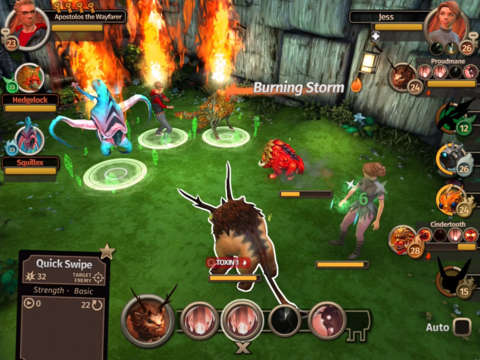The Pokemon universe would make an excellent setting for a massively multiplayer online game. Countless people wandering the world, fighting against other trainers and trading Pokemon and gear. When you’re not engaged in working with or against others, you’d be busy searching for and catching new Pokemon. The end of dungeon raids would yield rare evolution stones and creatures, prizes to bolster your status as a Pokemon Master.
Undead Labs’ Moonrise is not a Pokemon game, though it is Pokemon inspired. The mobile creature collecting-and-battling RPG takes some of the series more prominent elements and turns them on their heads, making for an enjoyable, refreshing take on the genre.
In Moonrise, you take on the role of a warden, someone trained to battle with the world’s numerous colorful creatures, called Solari–similar to the way you do in Pokemon. The warden can fight against other wardens’ teams of Solari or engage with wild Solari, which have been tainted by a mysterious purple haze that makes them aggressive. As a warden, it’s your job to defeat these creatures and help shake off the madness that has settled on them.
Many have mused on–or complained–about the strange predicament of Pokemon: young children beat them up, capture them, and essentially force them into slavery, dooming them to an eternity of dogfights against their own kind. Moonrise’s developers took cues from their other title, zombie survival sandbox State of Decay, and decided to treat these creatures’ lives more like resources and less like unfeeling objects.
In Moonrise, you don’t capture creatures–you recruit them. Each of the game’s various Solari come with specific combat conditions that, if met, will cause them to voluntarily join your side. There is no subduing, no capturing involved. But if you change your tactics to work around the needs of the Solari you are fighting, chances are at the end of the battle they will become yours.
A neat thing about Solari is that you can constantly change up their movesets. Each creature will learn one ability that cannot be deleted or swapped out. The three remaining abilities can be switched around at will with those of other Solari. For example, if you have a fire-type Solari that you feel needs a healing spell, you can pull the spell off an electric-type creature and swap their abilities. This makes Moonrise feel more customizable than other creature collection games, allowing you to micromanage your team’s fighting style and really tailor it to suit your own strategies.
Combat itself is fluid. Moonrise was built for mobile devices, and I can’t imagine playing it any other way than on a touchscreen. You tap the Solari you want to attack, tap the attack you want at the bottom of the screen, then tap the enemy you want to attack and wait a few seconds. You can have as many as two Solari on the battlefield at once, and if you time your attacks right, you can unleash a neverending assault on your opponent.
Another helpful piece of the combat puzzle is allowing the warden to attack as well. In Pokemon, trainers step back and let their creatures do the heavy lifting. In Moonrise, you can hurl spells and set up protective shields for your Solari. I liked this touch, having spent years making critters fight for me, because it gives your warden character a greater sense of agency in combat. There’s something intimate about being able to fight alongside these creatures, and having one extra set of hands to cast healing regeneration magic is always helpful.
But by far the best part about having your human character in combat is that it significantly changes the strategy. If you defeat an opposing warden, no matter how many Solari they has left to fight, you win. The battle ends in your favor if you take out your opponent at any time. This opens up tactics on a whole new level: you can spend time whittling away at your enemy’s six Solari or you can take them out directly, ignoring the creatures or shielding yourself from their attacks.
While there is a single-player campaign to Moonrise, the game’s constant connection to the servers means there’s unlimited options for PvP. While wandering each area on the world map looking for dungeons, you will find other players doing the same. You can choose to chat with them or challenge them to a duel. Defeating others earns you more rewards, with which you can buy healing items or gear for your warden.
There aren’t very many true MMOs in the mobile space at this time. Moonrise is still in early stages yet, but it has a lot of potential to win over that market. It’s perfect for short bursts of play, allowing you to dig through a dungeon on your morning commute or fight a quick duel over lunch, with very little fuss and complication. It’s a beautiful little piece that will appeal to strategists and the collection-minded, bringing what we love about those types of games into experiences that can be shared.
Powered by WPeMatico






